SEO
What Is Social Listening And How To Get Started

Most marketers now understand the value of social media as a marketing tool – and countless companies have now established their own presence across a variety of social platforms.
But while the importance of creating content and building an audience is well understood, many organizations are lacking when it comes to another key strength of social media: social listening.
Social listening is a strategic approach that can help your brand tap into the incredible breadth and depth of social media to hone in on what your target audience is saying and feeling – and why.
By investing in social listening, you can gain a deeper understanding of conversations happening around not just your brand but your broader industry, and extract meaningful insights to inform multiple areas of your business.
In this article, we’ll explore what social listening is, why it’s crucial for businesses today, and the tools that exist to help you do it before diving into tips for getting started with your social listening strategy.
Let’s get started.
What Is Social Listening?
Social listening is the practice of tracking conversations on social media that are related to your brand, analyzing them, and extracting insights to help inform your future marketing efforts.
These conversations can include anything from direct mentions of your brand or product to discussions around your industry, competitors, relevant keywords, or other topics that might be tangential to your business.
The idea of social listening is that you’re really getting to know your audience by sitting back and listening in to what they talk about – what their gripes are, what they’re interested in, what’s getting them excited right now, and much more.
Gathering this data and then examining it can help you in a number of ways, from uncovering useful product development insights to inspiring new content ideas or better ways to serve your customers.
Here are some of the things you can achieve through social listening:
- Tracking mentions of your brand, products, or services across social platforms.
- Evaluating public perception and sentiment towards your brand by assessing whether mentions are positive, negative, or neutral.
- Spotting trends that are emerging among your target market by noting common themes, topics, or keywords in conversations.
- Gaining a better understanding of your audience, including who they are, where they spend time online, what they want, and how your brand can connect with them.
As such, social listening isn’t just a powerful tool for marketing, but can also be leveraged to improve customer engagement and service, product development, and other areas of your business.
What’s The Difference Between Social Listening And Social Monitoring?
If you’re finding yourself a little confused about the difference between social listening and social monitoring, you’re not alone! The terms are often used interchangeably – when, in reality, they have different scopes and objectives.
Generally speaking, social monitoring is narrower and more focused on your brand specifically, while social listening takes more of a big-picture approach to gaining insights.
If social monitoring is about seeking out brand mentions and conversations to hear what people are saying, social listening is diving even deeper to understand why they’re saying those things.
Social monitoring typically involves tracking social activity directly related to your brand so that you can stay abreast of what’s happening at the moment and tackle any pressing issues.
In this regard, it’s often leveraged as a component of a company’s customer support program to help respond to queries, answer questions, and remedy complaints in a timely manner.
It can also help to identify trending topics or industry moments that might apply to your brand. Basically, social monitoring is all about being aware of what’s happening around your brand on social media so you can respond quickly.
Social listening does all of this, but also takes things a few steps further, expanding the scope of what you’re tracking and focusing on obtaining insights to help with brand strategy, content planning, and decision-making.
Where social monitoring might focus on mentions of your brand, social listening goes beyond that to explore broader consumer behavior and emerging industry trends, and make qualitative analyses of the conversations that are happening in those areas.
One analogy I’ve encountered that I find helpful for understanding the difference between the two: If social monitoring is akin to tending your own backyard, social listening is like taking a walk through your neighborhood and eavesdropping on conversations to better understand what your neighbors are interested in and concerned about.
While we are focused on social listening in this particular article, both social monitoring and social listening are important parts of an effective marketing strategy.
Why Is Social Listening Important?
As we’ve touched on, successful social listening can benefit many areas of your business – from your marketing to your product and your customer support. And all of this means it can have a big impact on your bottom line.
Let’s look closer at just some of the reasons why social listening is an important tool in your business’s arsenal.
Reputation Management
Social listening can help you get a sense of how your audience – and the general public – feels about your brand, products, messaging, or services.
By understanding both the positive and negative sentiments around your brand and where they come from, you can work to fill the gaps and improve perceptions of your company.
Understanding Your Audience
On that note, social listening is a great way to learn more about your audience – from your current customers to your prospects and beyond.
It offers a looking glass into what your target consumer is thinking about, their opinions, pain points, desires, etc. With this information, you have the power to customize your content, message, and products to serve their needs better.
Market Analysis
Social listening is a powerful tool for unearthing insights into your industry – trends, consumer behaviors, opportunities, etc. This is the kind of information that you can use to get ahead of your competitors and deliver the ultimate customer experience.
Competitive Insights
Speaking of competitors, social listening enables you to keep a watchful eye on your competitors and learn from their successes and failures.
You can use active listening to determine how your target market perceives your competitors and apply your findings to differentiate yourself from the pack.
Crisis Management
Let’s face it: Crises happen, no matter what your business or industry. But social listening can help you identify crises before they hit a boiling point, and address them in a timely manner.
Content Strategy
Want to know what content types and formats resonate best with your audience? Try social listening! Once you have the necessary insights, you’ll be able to create more engaging content.
Lead Generation
Social listening can drive lead generation in a number of ways.
You can use it as a tool to discover prospects who are interested in your industry, product niche, or topics related to your business.
Beyond this, by improving your content strategy, reputation, products, customer experience, and more using your social listening insights, you will ultimately boost more leads to your business.
Social Listening Tools
Given that social listening requires pulling data from millions of posts across social media and analyzing it, we would recommend using a tool to help with your efforts.
Here are a few popular social listening tools.
Hootsuite
Known for its social management features, Hootsuite also offers a comprehensive suite of capabilities to help with your social listening efforts.
The platform allows you to create custom streams to track hashtags, keywords, or mentions across a range of social platforms. You can use these to spot conversations in real-time and engage with them.
Using some of Hootsuite’s tools and integrations, you can also do things like track brand sentiment, listen into Reddit conversations, access consumer research, and more.
Pricing:
- 30-day free trial.
- Paid plans start at $99/month for the Professional tier and 249/month for the Team tier (billed annually).
- Hootsuite offers an Enterprise tier with custom pricing.
Sprout Social
Sprout Social is another leader in the social media management space that is super useful for social listening.
With Sprout Social’s Smart Inbox, you can pull all your mentions, comments, and DMs from across your social platforms into one single feed – helping you keep on top of what’s happening.
Other key features include audience analysis, campaign analysis, crisis management, competitor comparison, influencer recognition, sentiment research, and much more.
Pricing:
- 30-day free trial.
- Paid plans start at $249/month for the Standard tier, $399/month for the Professional tier, and $499/month for the Advanced tier (billed annually).
- Sprout Social offers an Enterprise tier with custom pricing.
Brandwatch
Brandwatch is a strong social listening and analytics platform that can help you track and analyze conversations online. It pulls data from 100 million sources, ensuring you’re not missing anything.
The Brandwatch tool will sift through brand mentions in real-time to analyze sentiment and perception, saving you a ton of time and manual effort.
Other key features include AI alerts for unusual mentions activity, conversation translation across multiple languages, tons of historical data, and more.
Pricing:
- Book a meeting with the Brandwatch team to learn more about pricing.
Meltwater
Meltwater’s social listening tool monitors data from a ton of different feeds, from Facebook to Instagram, Twitch, Reddit, YouTube, and many more. It can even recognize when your brand is talked about in a podcast!
Key features include topic and conversation trends analysis, custom dashboard and report building, consumer segmentation and behavior analysis, crisis management, and more.
Pricing:
- Contact the Meltwater team for pricing details.
Talkwalker
Another top name in the social listening space, Talkwalker monitors 150 million websites and 10+ social networks to power your real-time listening experience.
It offers AI-powered sentiment analysis in over 127 languages, notifications for any atypical activity, issue detection, conversation clustering, and much more.
Pricing:
- Contact the Talkwalker team for pricing.
6 Tips For Building A Social Listening Strategy
Now that you understand what social listening is and why it’s important – as well as a few of the tools you can use to power your social listening program – it’s time to start considering your strategy.
Here are six steps we recommend when building out your social listening strategy.
1. Define Your Goals & Objectives
As with any big project, your first step before starting should be to set clear goals for what you want to achieve.
Why are you doing this, and what is the desired result? Sit down with your team and talk through these points in order to align with your objectives.
You might have one key objective or several. Some potential options could be:
- Improve your company’s customer service and support.
- Gain insights to help inform product development and enhance product offerings.
- Track brand sentiment across current and potential customers.
- Develop a deeper understanding of the competitive landscape in your industry, and how your competitors are performing with social audiences.
- Stay on top of industry events and trends so you can spot content gaps and opportunities ahead of time.
Whatever your goals are, make sure you have them set from the beginning so you have clarity as you move forward.
2. Pick Your Tool Of Choice
While social listening can technically be done manually, it will never be as comprehensive as what you can get from leveraging a tool or platform.
Social media listening tools, like the ones we highlighted above, are able to synthesize data from millions of sources at once – not to mention their abilities to analyze sentiment, identify trends, spot activity, and more.
So, while they typically come with a price tag, the good ones are worth their weight in gold.
Do your research and choose a tool that aligns with your objectives and your team’s budget.
Look for something that monitors many different touchpoints, offers comprehensive analytics, is customizable, and integrates with your existing tech stack (if necessary).
3. Identify Target Keywords And Topics
This step is crucial: Take the time to define the keywords, topics, and hashtags that you want to “listen in” to – as these will provide the basis for your listening efforts.
Be sure to include keywords and themes that are relevant to your brand but also your industry, so that you get information that’s most useful to you. You could also discuss any keywords or topics you might want to exclude and why.
These might evolve or change over time, and that’s okay – this is about setting up a well-considered and focused foundation based on what matters most right now, and what will help you achieve your goals.
4. Decide On Your Workflow
Who will be responsible for monitoring your social listening data? Who should be responding to relevant mentions? Whose job is it to analyze the data and report on learnings and progress?
These are all things you should consider early on so that you can develop a clear workflow that outlines responsibilities.
By establishing the process early on, you’ll make sure that your efforts are not in vain and that you’re able to really put your data to use.
One recommendation: Make sure that somebody is regularly monitoring conversations and engaging where necessary. You should be keeping a keen eye on your listening activity – and automated alerts can be very helpful here.
5. Adapt As Needed
As part of the workflow we just discussed, somebody (or several people) should be responsible for routinely analyzing the data you’re collecting – as, unfortunately, it won’t analyze itself.
Set up a consistent process for diving into your data, extracting insights, and then acting on them.
There’s no point in allocating resources to a social listening program if you’re not using the learnings to benefit your business.
So, be sure to adapt your content strategy, marketing efforts, customer service, and so on based on what the insights are telling you.
6. Don’t Forget Measurement
We all know the importance of social media measurement – and this extends to your social listening efforts.
As time goes on, continue to measure the success of your efforts against the goals and objectives you set out for yourself.
This will help you evaluate the impact of your social listening, and whether there are areas you should pivot or refine based on the data you’re seeing.
You can also track social engagement metrics over time to see if your learnings have provided a boost in your social performance as a whole.
In Conclusion
With millions of conversations happening all around us on social media, any brand that isn’t engaging in social listening is missing a major opportunity.
By taking the time to proactively (and attentively) listen to your audience and target consumers, understand them better, and put their feedback to use, you can drive considerable success for your business.
So, take some of the advice we’ve shared here and start building out your social listening strategy today!
More resources:
Featured Image: batjaket/Shutterstock
FAQ
What is the significance of social listening for modern businesses?
Social listening plays a pivotal role for modern businesses by offering critical insights into audience behavior, industry trends, and brand perception. By analyzing conversations on social media related to their brand or market, companies can adequately respond to customer feedback, adapt their marketing strategies, and anticipate consumer needs. It not only aids in shaping product development and content strategy but also enhances customer service, reputation management, and competitive analysis. This strategic approach empowers businesses to make informed decisions based on the direct sentiments and unfiltered conversations of their target audience.
Can you differentiate between social monitoring and social listening?
Social monitoring and social listening are distinct yet complementary components of a comprehensive social media strategy. Social monitoring is more tactical, focusing on tracking and responding to direct brand mentions, queries, and specific conversations related to immediate issues. Its objective is to maintain awareness of what’s currently being said about a brand and to participate in these conversations promptly. Social listening, on the other hand, employs a broader, more strategic approach. It goes beyond mere tracking, analyzing the underlying sentiments, causes, and implications of social discourse to extract actionable insights. This process not only involves engagement but also a deep analysis of consumer behavior patterns and industry trends for a long-term strategy formulation.
Which social listening tools are recommended for businesses to utilize?
For businesses looking to execute an effective social listening strategy, a variety of tools are available that can help streamline the process. These include:
- Hootsuite: Offers custom streams to monitor social conversations and sentiment, alongside integrations for broader consumer research.
- Sprout Social: Features a Smart Inbox to consolidate social interactions for monitoring. It also provides tools for audience and competitor analysis.
- Brandwatch: Analyzes brand mentions from an extensive range of sources, offering AI-powered sentiment analysis and trend spotting.
- Meltwater: Monitors various feeds, from mainstream social media to Reddit and podcasts, enabling comprehensive analysis.
- Talkwalker: Provides monitoring and analytical capabilities over a broad spectrum of online platforms, backed by AI sentiment analysis.
Businesses should select a tool that aligns with their specific needs and objectives, focusing on features like comprehensive analytics, broad monitoring capabilities, and the ability to integrate with existing technological infrastructure.
SEO
Why Every Marketer Should Be On Reddit

In its nearly 20 years of existence, Reddit has built a robust, dynamic, and highly engaged community.
It has cemented itself as not only one of the key influencers for the internet culture we have come to know today, but also as one of the top 10 social media sites in the world, with more than 500,000 monthly visitors across more than 100,000 active communities.
Despite its size and influence, marketers have long avoided, overlooked, and failed to establish a presence on what is arguably one of the most influential social media sites today.
To be fair, Reddit has always been known as one of the hardest communities to have marketing success with, requiring months (if not years) of dedicated commitment to actually being a part of the community and engaging with your audience through meaningful, genuine, and honest interactions.
To many, that is just too much risk and too much work, but let’s be honest – most amazing things take risk and hard work. And for all of you who put in that work to be successful on Reddit, you already see the payoff it brings.
Regardless of the reasons, marketers who continue to overlook Reddit’s potential are missing out on an extremely influential community with ideal targeted demographics, where authenticity and genuine connections lead to valuable information, positive branding, and marketing success.
Not convinced? Let’s take a closer look at Reddit!
Reddit Stats You Cannot Ignore
Reddit users are dedicated to their use of the platform, with a reported 82 million (16.4%) of its 500 million users visiting the site daily, sharing over 1 billion posts, with over 16 billion comments across 100,000+ active communities, making it easily one of the top visited and most active sites in the United States today.
The user base is so loyal that they spend, on average, 20 minutes on the platform each day (and over 45 minutes a day for long-time users of more than 7 years) and, in many cases, are inactive on other social platforms.
This makes Reddit one of the only places to actually get in front of this massive audience, with 32% being inactive on Facebook, 37% on Instagram, 41% on TikTok, and 53% on X.
When it comes to demographics, a 2019 survey concluded that the overall Reddit audience was majority male (59%), ranged in age (36% aged 18-29; 25% aged 30-49), and well educated (42% college degree; 31% some college) making them an ideal audience many businesses looking for success.
They also helped Reddit improve revenues by 21% to $804 million in 2023, with a global addressable market for advertising estimated at $1.4 trillion by 2027.
Thought by many to be mostly a North American audience, Reddit claims more than 50% of its traffic comes from international users, a rather impressive climb from its earlier years.
It is important to remember, though, that Reddit is a platform that allows communities to grow and thrive, so those demographics change from subreddit to subreddit.
If that isn’t enough to grab your attention, surveys have found that 75% of users find Reddit a trustworthy source for making purchasing decisions.
For years now, it has been included heavily and prominently in Google search results, which have become even more visible due to reports following their inclusion in SGE results and with Google’s recent $60 million a year deal with Reddit to have real-time access to Reddit content and to use its content to train Google’s future AI models.
Speaking of Reddit’s visibility in Google’s search results, let’s take a closer look at why that deal is so important, especially to search marketers.
Reddit In Google Search, SGE, And Google’s Reddit Deal
For years, Reddit results have been prominently displayed in Google’s search results – so much so that users have even started adding the term “reddit” to the end of their search queries.
So often, you will see Google suggest search lines with the term “reddit” prefilled at the end.
Even without selecting the query that includes “reddit,” you will notice Reddit’s prominent placement in two places: discussions and forums, and Reddit sitelinks, which are both just below the ads and the first organic result.
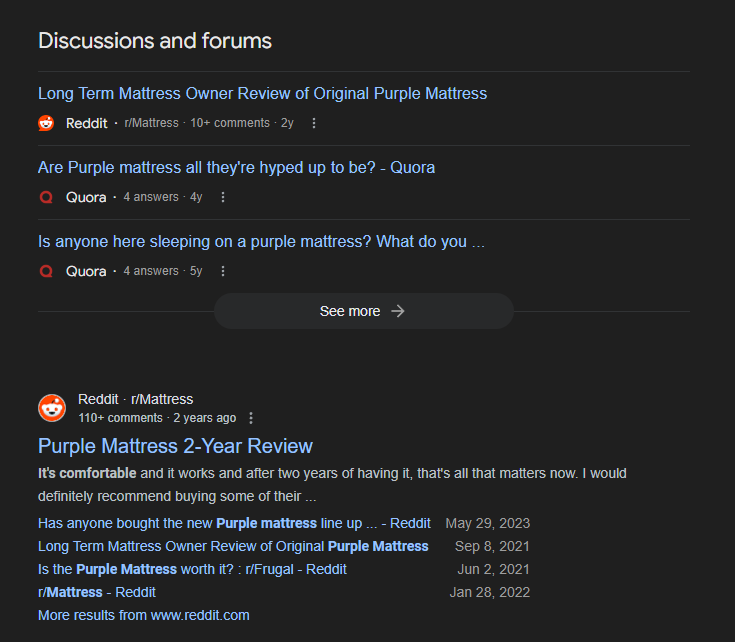 Screenshot by author from search for [are purple mattresses good], Google, May 2024
Screenshot by author from search for [are purple mattresses good], Google, May 2024This was amplified by Google’s recent Helpful Content Update (HCU), which allowed platforms like Reddit and other forums to show up more frequently in search results,
Reddit’s ability to be helpful in satisfying a user’s search for information is so successful – in combination with reported shortages in new content for AI models from all major platforms – it is not surprising Google struck a deal with Reddit to show its content faster in search results and to use the content in training future AI models.
Since news of the deal between Reddit and Google was reported, there has been a lot of additional focus on Reddit’s visibility in Google’s search results.
Experts throughout the search industry report an increase in not only the total visibility of Reddit going up within search but also the speed at which a Reddit post is indexed and shown to users.
Google responded to concerns about Reddit showing up more in search results, saying that “some of the SEO folks who tend to be vocal on this platform (X) really dislike seeing more forum content in our search results. But actual searchers seem to like it. They proactively seek it out. It makes sense for us to be showing it to keep the search results relevant and satisfying for everyone.”
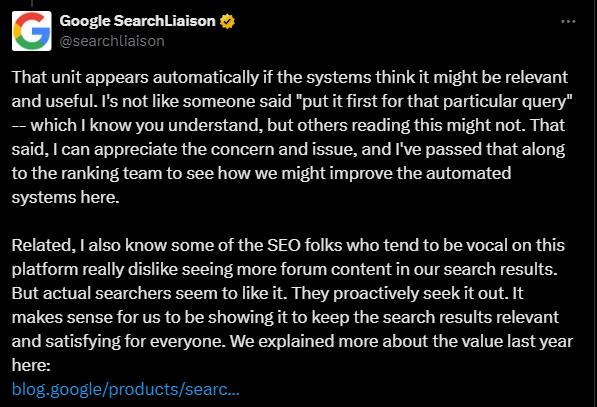 Screenshot by author from X (Twitter), May 2024
Screenshot by author from X (Twitter), May 2024Although disputed by Google, Roger Montii wrote about one report of Reddit content being indexed within five minutes.
ChatGPT to Surface Reddit Content
Adding to the deal Reddit made with Google, it was recently reported that OpenAI has partnered with Reddit to surface their content in ChatGPT, adding to the clear value that both OpenAI and Google see in Reddit’s content today and in the future.
Of course, this has sparked a lot of interest in companies of all sizes. They want to figure out how their brands can participate and succeed on Reddit in hopes of increasing their visibility in Google’s search results, SGE, and ChatGPT and building their brand’s visibility amongst one of the most influential audiences on the internet today.
**Quick warning: Reddit requires genuine, long-term engagement and a strategy for success. So, I would definitely advise individuals and businesses to avoid trying to game, spam, or blindly jump into marketing on Reddit and take the time to really understand the platform, its audience, and your place of value within its communities.
Let’s look at how some major brands have been successful on Reddit in the past.
noosa Yoghurt
Noosa Yoghurt’s 2021 back-to-school campaign on Reddit was a great example of tapping into niche audiences to create engaging, user-driven content.
To capitalize on Reddit’s community of vocal yogurt enthusiasts, noosa launched a Flavor Poll that invited Redditors to upvote their favorite noosa flavors in the comments. This created a sense of community and interactivity around what could have been a standard poll.
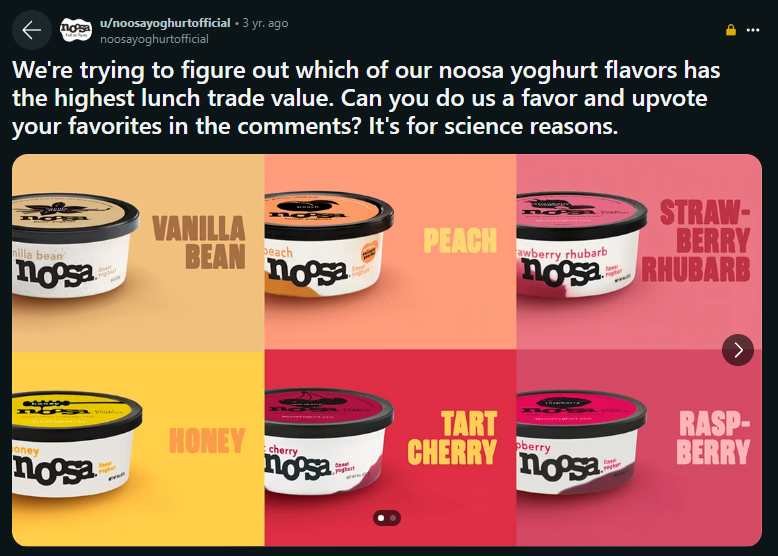 Screenshot by author from Reddit, May 2024
Screenshot by author from Reddit, May 2024After tallying the upvotes, noosa published a Promoted Post that showcased the results using a sleek custom infographic, highlighting the community’s favorites while also giving the brand important insight into consumer preferences.
 Screenshot by author from Reddit, May 2024
Screenshot by author from Reddit, May 2024The results:
- 49% increase in brand recall among Reddit users who were exposed to the campaign.
- 30% increase in brand favorability.
- 39% increase in purchase intent (15X the typical lift observed in the food vertical).
- 50+ billion monthly views.
Sony Pictures Germany
To drum up excitement around the release of “Spider-Man: Across the Spider-Verse” in Germany, Sony Pictures Germany crafted a Reddit campaign that combined organic and promoted content to engage the platform’s robust fan communities.
The brand created a Reddit account under the protagonist’s name, u/MilesMorales, and used it to share exclusive content directly within Spiderman-related subreddits.
It also organized an AMA with the German voice actor Miles Morales to create a more personal connection with fans and promoted video posts featuring the movie trailer to amplify the excitement.
 Screenshot by author from Reddit, May 2024
Screenshot by author from Reddit, May 2024The results:
- Sony Pictures Germany achieved a click-through rate (CTR) that was 344% higher than that of its standard paid media.
- 831 upvotes.
- 618,000 impressions.
- The film remained No. 1 on the German movie charts for three consecutive weeks.
It is important to note that promoting your content and your brand on Reddit is definitely not the only value Reddit can bring you and your business.
Reddit is an amazing place to get honest feedback.
Whether you are trying to figure out what your target audience wants from your brand, test out a new feature or concept before investing and launching it openly, or even just to have continued open communication with your customers to support them and keep them connected to your brand, Reddit can help you succeed in an amazing way.
Transamerica Helping Reddit Make Dollars Make Sense
Transamerica’s campaign on Reddit is a great example of a company identifying an opportunity to connect with its target audience on the subreddit /r/finance.
This allows the company to better understand its customers’ needs and focus on content creation and future marketing plans.
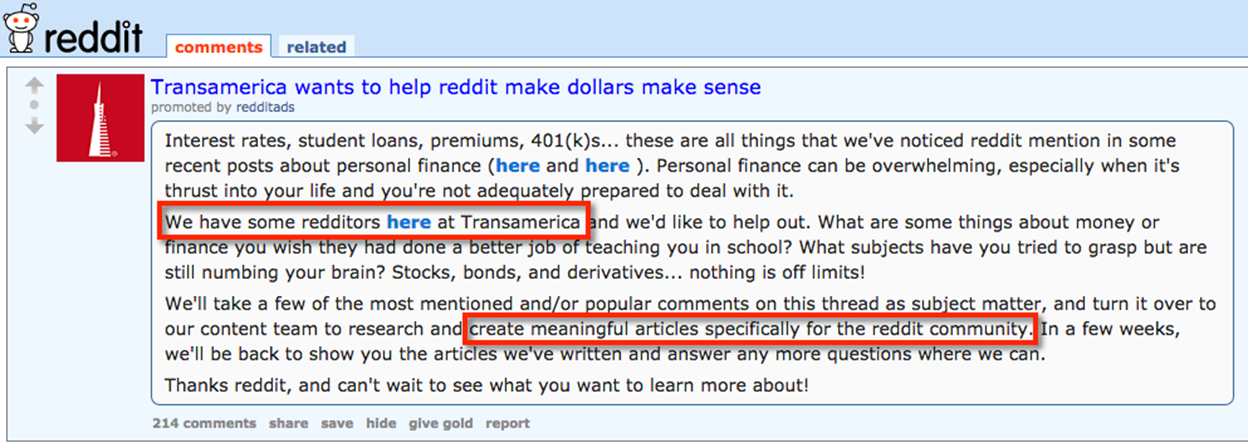 Screenshot by author from Reddit, May 2024
Screenshot by author from Reddit, May 2024Aligning itself with its audience by demonstrating awareness of the topics around personal finance happening in the subreddit, as well as acknowledging the Redditors working at the company, it asked what topics it could create “specifically for the reddit community” around the topic of finance.
It stayed involved and engaged throughout the campaign, responding to threads and maintaining a lighthearted and sometimes humorous tone.
 Screenshot by author from Reddit, May 2024
Screenshot by author from Reddit, May 2024After getting all the feedback it needed, it created content around the more popular requests, going as far as branding and designing them similar to Reddit.
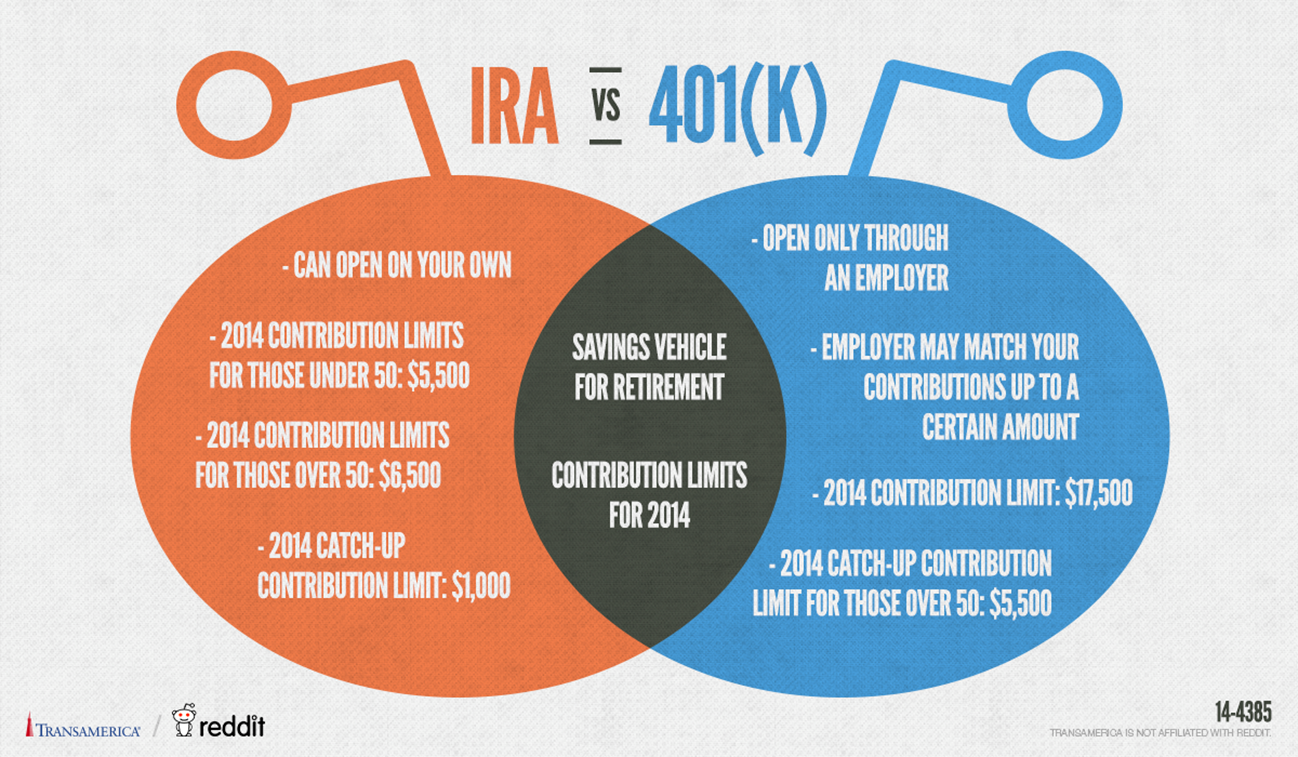 Screenshot by author from Reddit, May 2024
Screenshot by author from Reddit, May 2024It even took the time to individually comment a link to the published content on its site, bringing attention back to the overall campaign and the content it created.
This campaign was 10 years ago, and it is still referenced as a core example of engaging on Reddit as a brand in a respectful, thoughtful, and meaningful way.
Why You Should Be On Reddit Wrapup
TL;DR: If your brand has something meaningful to say and is interested in truly connecting with your audience, then yes, you should be on Reddit.
These successful brand campaign examples showcase Reddit’s power when used correctly. With research to understand the specific communities you want to reach, Reddit can have exceptional performance compared to other channels.
The stakes are high to get it right because Reddit communities can be highly negative toward self-serving promotion. But if you put in the effort and solve people’s needs and problems, Reddit has the potential to be a high-performance channel.
Edit: Updated daily active users figure based on Reddit’s Q1 Earnings Report
More resources:
Featured Image: Julia Tim/Shutterstock
SEO
No Algorithmic Actions For Site Reputation Abuse Yet

Google’s Search Liaison, Danny Sullivan, has confirmed that the search engine hasn’t launched algorithmic actions targeting site reputation abuse.
This clarification addresses speculation within the SEO community that recent traffic drops are related to Google’s previously announced policy update.
Sullivan Says No Update Rolled Out
Lily Ray, an SEO professional, shared a screenshot on Twitter showing a significant drop in traffic for the website Groupon starting on May 6.
Ray suggested this was evidence that Google had begun rolling out algorithmic penalties for sites violating the company’s site reputation abuse policy.
However, Sullivan quickly stepped in, stating:
“We have not gone live with algorithmic actions on site reputation abuse. I well imagine when we do, we’ll be very clear about that. Publishers seeing changes and thinking it’s this — it’s not — results change all the time for all types of reasons.”
We have not gone live with algorithmic actions on site reputation abuse. I well imagine when we do, we’ll be very clear about that. Publishers seeing changes and thinking it’s this — it’s not — results change all the time for all types of reasons. The actions currently only…
— Google SearchLiaison (@searchliaison) May 23, 2024
Sullivan added that when the actions are rolled out, they will only impact specific content, not entire websites.
This is an important distinction, as it suggests that even if a site has some pages manually penalized, the rest of the domain can rank normally.
I don’t know what that chart is based on. Third-party visibility stats? Or is this data from each site reported directly from Search Console? But beyond that, again, we’ve not added an algorithmic component for site reputation abuse. What I said in my original response is still…
— Google SearchLiaison (@searchliaison) May 23, 2024
Background On Google’s Site Reputation Abuse Policy
Earlier this year, Google announced a new policy to combat what it calls “site reputation abuse.”
This refers to situations where third-party content is published on authoritative domains with little oversight or involvement from the host site.
Examples include sponsored posts, advertorials, and partner content that is loosely related to or unrelated to a site’s primary purpose.
Under the new policy, Google is taking manual action against offending pages and plans to incorporate algorithmic detection.
What This Means For Publishers & SEOs
While Google hasn’t launched any algorithmic updates related to site reputation abuse, the manual actions have publishers on high alert.
Those who rely heavily on sponsored content or partner posts to drive traffic should audit their sites and remove any potential policy violations.
Sullivan’s confirmation that algorithmic changes haven’t occurred may provide temporary relief.
Additionally, his statements also serve as a reminder that significant ranking fluctuations can happen at any time due to various factors, not just specific policy rollouts.
FAQ
Will Google’s future algorithmic actions impact entire websites or specific content?
When Google eventually rolls out algorithmic actions for site reputation abuse, these actions will target specific content rather than the entire website.
This means that if certain pages are found to be in violation, only those pages will be affected, allowing other parts of the site to continue ranking normally.
What should publishers and SEOs do in light of Google’s site reputation abuse policy?
Publishers and SEO professionals should audit their sites to identify and remove any content that may violate Google’s site reputation abuse policy.
This includes sponsored posts and partner content that doesn’t align with the site’s primary purpose. Taking these steps can mitigate the risk of manual penalties from Google.
What is the context of the recent traffic drops seen in the SEO community?
Google claims the recent drops for coupon sites aren’t linked to any algorithmic actions for site reputation abuse. Traffic fluctuations can occur for various reasons and aren’t always linked to a specific algorithm update.
Featured Image: sockagphoto/Shutterstock
SEO
WP Rocket WordPress Plugin Now Optimizes LCP Core Web Vitals Metric

WP Rocket, the WordPress page speed performance plugin, just announced the release of a new version that will help publishers optimize for Largest Contentful Paint (LCP), an important Core Web Vitals metric.
Large Contentful Paint (LCP)
LCP is a page speed metric that’s designed to show how fast it takes for a user to perceive that the page is loaded and read to be interacted with. This metric measures the time it takes for the main content elements has fully loaded. This gives an idea of how usable a webpage is. The faster the LCP the better the user experience will be.
WP Rocket 3.16
WP Rocket is a caching plugin that helps a site perform faster. The way page caching generally works is that the website will store frequently accessed webpages and resources so that when someone visits the page the website doesn’t have to fetch the data from the database, which takes time, but instead will serve the webpage from the cache. This is super important when a website has a lot of site visitors because that can use a lot of server resources to fetch and build the same website over and over for every visitor.
The lastest version of WP Rocket (3.16) now contains Automatic LCP optimization, which means that it will optimize the on-page elements from the main content so that they are served first thereby raising the LCP scores and providing a better user experience.
Because it’s automatic there’s really nothing to fiddle around with or fine tune.
According to WP Rocket:
- “Automatic LCP Optimization: Optimizes the Largest Contentful Paint, a critical metric for website speed, automatically enhancing overall PageSpeed scores.
- Smart Management of Above-the-Fold Images: Automatically detects and prioritizes critical above-the-fold images, loading them immediately to improve user experience and performance metrics.
All new functionalities operate seamlessly in the background, requiring no direct intervention from the user. Upon installing or upgrading to WP Rocket 3.16, these optimizations are automatically enabled, though customization options remain accessible for those who prefer manual control.”
Read the official announcement:
WP Rocket 3.16: Improving LCP and PageSpeed Score Automatically
Featured Image by Shutterstock/ICONMAN66
-
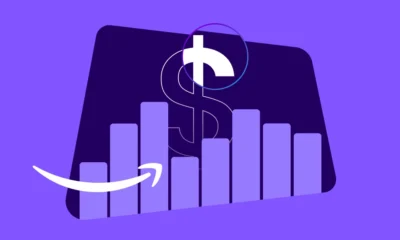
 MARKETING6 days ago
MARKETING6 days agoUnlocking AMC Insights Series: Leveraging Media Overlap Analysis for Enhanced Conversions
-

 MARKETING4 days ago
MARKETING4 days ago7 Things Creators Should Know About Marketing Their Book
-

 MARKETING5 days ago
MARKETING5 days agoProfit More, Work Less: 4 Steps to Niching Down For Your Agency
-

 SEO4 days ago
SEO4 days agoGoogle’s AI Vision Driven By Panic, Not Users: Former Product Manager
-

 SEO3 days ago
SEO3 days agoInternational SEO For 2024: 9-Point Checklist For Success
-
SEARCHENGINES4 days ago
Daily Search Forum Recap: May 20, 2024
-

 AFFILIATE MARKETING7 days ago
AFFILIATE MARKETING7 days agoBrand New GPT-4o Revealed: 3 Mind Blowing Updates and 3 Unexpected Challenges for Entrepreneurs
-

 SEO6 days ago
SEO6 days agoGoogle Hints At Improving Site Rankings In Next Update














